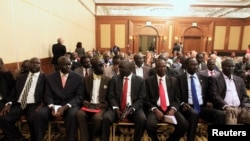NAIROBI, KENYA —
South Sudan’s government says a meeting with regional leaders has helped move forward plans for a dialogue between the president and his political rival to end the violence that has divided the country. The development comes as a humanitarian crisis continues to deepen in the young nation.
South Sudan’s President Salva Kiir met Thursday with Kenyan President Uhuru Kenyatta and Ethiopian Prime Minister Hailemariam Desalegn in capital city Juba to determine a way to end the ongoing crisis.
A spokesman for South Sudan’s Foreign Affairs Ministry, Mawien Makol Arik, said the leaders discussed efforts to bring Kiir and former Vice President Riek Machar into a dialogue.
Kiir has accused Machar and his supporters of being behind an attempted coup on December 15 that has divided the military against itself in some areas and has stoked ethnic tensions. Machar denies the coup accusations, but he has called for the military to remove Kiir from power.
-Born 1953 in Sudan
-Former rebel leader
-South Sudanese President Salva Kiir dismissed him from vice presidency in July
-Criticized current government for alleged corruption, tribalism and insecurity
-Announced plans to run for president in 2015
-Kiir accused him in December, 2013 of plotting a coup
Machar has said he is ready for talks if the government releases his political allies, who were arrested during the first days of the crisis.
Foreign Affairs spokesman Arik said the government will not agree to that request.
"The president is willing to go into dialogue with this faction, provided there’s no pre-condition, which would include the release of the political prisoners,” said Arik.
Fluid situation
No deadline has been set for the start of negotiations.
Arik said the mechanisms for the way forward will be discussed further on Friday in a meeting of representatives of the Horn of Africa regional grouping, IGAD, in Nairobi.
Meanwhile, South Sudan’s military says troops battled rebel soldiers Thursday in Unity state, a key oil-producing region where violence between factions of the armed forces has been severe.
U.N. officials have said more than 1,000 people may have been killed across the country since fighting began earlier this month. The United Nations says it hopes to begin receiving within the next 48 hours critical reinforcements of military hardware and personnel for its overstretched peacekeeping mission in South Sudan, which is on the verge of civil war.
Displaced persons
At a press conference Thursday, U.N. Special Representative for South Sudan Hilde Johnson welcomed any efforts to reconcile the warring factions, in the interest of civilians caught in the crossfire.
“Establishing a protective environment for civilians so that they feel safe and can return home with their families can solve this problem for all of us and that what we hope to see and that’s going to be a major task for us as a mission and for the government,” said Johnson.
Tens of thousands of civilians have taken refuge at U.N. bases across the country, putting a strain on resources.
The U.N. Security Council agreed Tuesday to send an additional 5,000 peacekeepers to the country.
South Sudan’s President Salva Kiir met Thursday with Kenyan President Uhuru Kenyatta and Ethiopian Prime Minister Hailemariam Desalegn in capital city Juba to determine a way to end the ongoing crisis.
A spokesman for South Sudan’s Foreign Affairs Ministry, Mawien Makol Arik, said the leaders discussed efforts to bring Kiir and former Vice President Riek Machar into a dialogue.
Kiir has accused Machar and his supporters of being behind an attempted coup on December 15 that has divided the military against itself in some areas and has stoked ethnic tensions. Machar denies the coup accusations, but he has called for the military to remove Kiir from power.
Riek Machar
Riek Machar-Born 1953 in Sudan
-Former rebel leader
-South Sudanese President Salva Kiir dismissed him from vice presidency in July
-Criticized current government for alleged corruption, tribalism and insecurity
-Announced plans to run for president in 2015
-Kiir accused him in December, 2013 of plotting a coup
Foreign Affairs spokesman Arik said the government will not agree to that request.
"The president is willing to go into dialogue with this faction, provided there’s no pre-condition, which would include the release of the political prisoners,” said Arik.
Fluid situation
No deadline has been set for the start of negotiations.
Arik said the mechanisms for the way forward will be discussed further on Friday in a meeting of representatives of the Horn of Africa regional grouping, IGAD, in Nairobi.
Meanwhile, South Sudan’s military says troops battled rebel soldiers Thursday in Unity state, a key oil-producing region where violence between factions of the armed forces has been severe.
U.N. officials have said more than 1,000 people may have been killed across the country since fighting began earlier this month. The United Nations says it hopes to begin receiving within the next 48 hours critical reinforcements of military hardware and personnel for its overstretched peacekeeping mission in South Sudan, which is on the verge of civil war.
Displaced persons
At a press conference Thursday, U.N. Special Representative for South Sudan Hilde Johnson welcomed any efforts to reconcile the warring factions, in the interest of civilians caught in the crossfire.
“Establishing a protective environment for civilians so that they feel safe and can return home with their families can solve this problem for all of us and that what we hope to see and that’s going to be a major task for us as a mission and for the government,” said Johnson.
Tens of thousands of civilians have taken refuge at U.N. bases across the country, putting a strain on resources.
The U.N. Security Council agreed Tuesday to send an additional 5,000 peacekeepers to the country.






